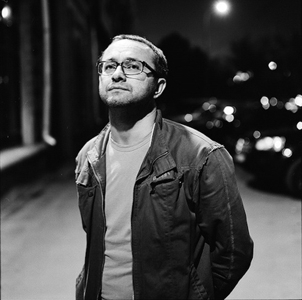The Father-Thing: Andrei Zvyagintsev's The Return
07/26/2004
Feisty, diminutive 13-year-old Ivan (Ivan Dobronravov) lives with his mother (Natalia Vdovina) and easygoing, tall, 15-year-old brother Andrei (Vladimir Garin) in a small, grimy Russian town. Their father (Konstantin Lavronenko) has long since departed the scene – until one day, completely out of the blue, he returns. A dour, steely presence, Dad doesn’t say much, but next day takes the boys on a “fishing trip.” While Andrei does his best to re-establish friendly terms with his uncommunicative parent, Ivan rebels – and even questions whether this mysterious stranger really is their father at all. When they reach their destination at a remote lake, events take an even more enigmatic turn…
The 2003 Venice Film Festival introduced a new star for the world of arthouse cinema when Novosibirsk-born 39-year-old Zvyagintsev’s The Return won the main prize, the Golden Lion. Few outside Russia had previously heard of the writer-director, who worked as an actor in various independent theatre projects before directing a trio of TV shorts in 2000: Busido, Obscure and Choice. Now, suddenly, he was the latest in the long line of Russian directors to be hailed as ‘the new Tarkovsky’: a comparison perhaps encouraged by the fact that the hero of Tarkovsky’s 1962 debut Ivan’s Childhood shares much more than just a name with Zvyagintsev’s Ivan. But this Ivan isn’t faced with as much peril as the hero of Tarkovsky’s wartime tale – nor is he quite so alone. Brother Andrei is played by 15-year-old Vladimir Garin, who died in a swimming accident shortly after the completion of filming. This tragic back-story was well-known at Venice – likewise, Uzak‘s success at Cannes ’03 was tinged with sadness following the recent death of one of its two leads.
While Uzak didn’t win the Palme d’Or (rightly losing out to Gus Van Sant’s remarkable Elephant) at Cannes, it did obtain a lesser-known but arguably more august honour some months later: the Fipresci Grand Prix, awarded by the international film-critics’ association for the best feature of the year. And The Return looks odds-on to follow suit: it has been ecstatically received on the film-festival circuit, and by the critics in each country where it has obtained distribution: for Peter Bradshaw in The Guardian, the film “already feels canonical.”
And it’s easy to see why: this is suitably austere, slow, ambitious arthouse material in which painful, primal family tensions are skilfully dramatised within a tale of fable-like simplicity. Largely thanks to the astonishing performance from young Dobronravov, fiery emotions are seldom never far from the calm surfaces captured Mikhail Krichman’s camera. In collaboration with the cinematographer and Andrei Dergachev (score-composer), Zvyagintsev achieves passages of chilly, doomy poetry, full of foreboding and ambiguity. The Russian landscape is a crucial factor: beautiful, vast and neutral, but mysterious and at times capable of seeming almost cruelly hostile when the characters are drenched by viciously sudden rainstorms. The Return stubbornly guards its many secrets, allowing us glimpses of the truth like something bright briefly glimpsed (or was it?) in deep, dark water.
The Return establishes its own mood and pace from the very first scene, but thematically and stylistically there are strong echoes of (at least) two previous films. The most obvious reference-point (and one which Zvyagintsev has presumably seen) is Roman Polanski’s 1962 debut, Knife in the Water: a claustrophobic three-hander involving much water, remote eastern Europe locales artistically captured, power struggles, a knife. But The Return is also oddly reminiscent of a lesser-known film which Zvyagintsev may not have caught: John Sayles’s Limbo (1999), which resolves itself into a claustrophobic three-hander involving much water, remote locales, fish, uncertain/violent family bonds, campfires, a diary – and a climax deploying a narrative ellipsis which, depending on one’s point of view, is either teasingly audacious or wildly frustrating.
Zvyagintsev’s third-act non-resolution isn’t so blunt as Sayles’s, of course, but many viewers may at first feel they have been unfairly denied crucial information – at this point, they may start picking holes in what has been at times a somewhat over-composed and deliberate piece of work, one in which the choice of shots and camera movements call undue attention to their own brilliance. The selection of monochrome photographs that conclude the film, for instance, are rather implausibly accomplished – considering they are supposed to have been taken by the boys through the course of the narrative. On balance, however, the finale is powerful and thought-provoking – one that puts us squarely in the shoes of the film’s teenage protagonists. The plaudits for Zvyagintsev have been perhaps somewhat excessively deafening – he isn’t quite the finished article as yet. But neither was that another Andrei, back in ’62.
Neil Young
www.jigsawlounge.co.uk
